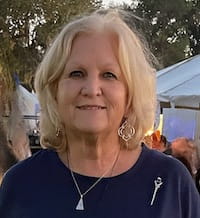A common observation led Terri Jowers and Guillermo Wippold, Ph.D., to join forces: Only about a quarter of the people who attend health screenings or health promotion events are men.
Jowers is the interim executive director of the South Carolina Community Health Worker Association (SCCHWA) and served as director of Healthy Columbia, a grassroots organization aiming to improve health in the city’s under-resourced neighborhoods, from 2012 to 2023. Wippold is a University of South Carolina researcher with a strong interest in community-based interventions.

“Healthy Columbia had health screenings weekly in under-resourced communities,” said Jowers. “What we saw year after year was that the numbers were consistent. We saw around 75% women and 25% men, and the men whom we did encounter often had big old health issues that weren’t identified until later, when there were a lot of complications.”
Wippold, who had led health promotion interventions in YMCAs, medical clinics and churches with predominantly Black congregations in Florida and Kansas before coming to South Carolina, had noticed the same thing.
“Very, very few men were participating in these health promotion events,” he said.
When Wippold arrived in South Carolina, he began to look for community partners to continue his work. He soon came across Healthy Columbia and contacted Jowers.

When the two met, they discovered their common interest in improving engagement by men of color in health screenings and events and decided to apply for, and in 2020 received, pilot funding from the South Carolina Clinical & Translational Research Institute (SCTR) through its Community-Engaged Scholars Program (CES-P).
The program, which is currently accepting applications, funds pilot projects led by teams made up of both community advocates and academic researchers. The goal is to improve health outcomes, particularly in under-resourced populations.
“The beauty of the program is that it encourages input from community stakeholders so that those people who are directly affected by health disparities and who live in very rural, underresourced areas weigh in on how the research is conducted,” said Michelle Nichols, Ph.D., who directs CES-P.
“Health information needed to come from someone who looked like them, who had a similar lived experience and who was trained to give them good information and guidance.”
— Terri Jowers
Although very grateful for the funding that allowed them to launch their project, Wippold and Jowers are perhaps most appreciative of the ongoing mentorship the program and its leadership have provided. Jowers feels particularly indebted to the late Cathy Melvin, Ph.D., who directed SCTR’s community engagement program at the time of Jowers’ and Wippold’s CES-P award.
“Cathy Melvin was an incredible, incredible person. What a huge loss to South Carolina and to the MUSC family,” said Jowers. “To us, she was gracious and generous and so wise, so that was a particular blessing for us.”
Jowers and Wippold knew that the first step in addressing the disparity in the use of preventive health services was to listen to the men. With pilot funding from CES-P, they recruited a core leadership team of five Black men from two of South Carolina’s poorest counties, Aiken and Barnwell, to draft survey questions and provided them the necessary training so that they could administer the survey to 22 other Black men. Of the themes that emerged, one of the most important was that men preferred peer-to-peer health education – in other words, they preferred getting their health information from other Black men.
“Health information needed to come from someone who looked like them, who had a similar lived experience and who was trained to give them good information and guidance,” said Jowers.
For Jowers, community health workers (CHWs) fit that bill perfectly.
“Community health workers are absolutely the experts in lived experience,” she said. “We’ve been there; we’ve done it. We’ve struggled to pay our rent. We’ve struggled to keep our lights on. We’ve struggled to make the decision between putting food on our table and buying medicine. And because of that lived experience, there’s a level of trust that is almost sacred.”
Unfortunately, only about 11% of current community health workers in South Carolina are men. SCCHWA is actively pursuing ways to address that disparity. Encouragingly, two faculty members at South Carolina State University (SCSU), a historically Black university, were recently awarded funding from the National Institutes of Health to implement a CHW training program. The South Carolina Community Health Worker Credentialing Council approved SCSU’s Core Competency Training Program, and to date, SCSU has trained more than 50 students, including 11 Black men.
Jowers and Wippold have made the data from their study available to the SCSU team and to other teams seeking grant monies to fund interventions to address the problem. For example, when Jowers and Wippold presented their findings at the annual meeting of the National Association of Community Health Workers earlier this year, 20 or so people in the audience agreed to form a leadership team to find ways to recruit more male CHWs. They are using data from Jowers and Wippold to apply for funding for their efforts.
“We have this misconception that people in general need to adapt to our health services. Instead, health services need to adapt to those they serve.”
— Dr. Guillermo Wippold
SCCHWA has received state funding to improve men’s health in four under-resourced South Carolina counties with large Black populations: Allendale, Barnwell, Bamberg and Orangeburg. The ABO initiative will use a peer-to-peer model for health messaging to men of all ages. Marcus Rivera, former mayor of the town of Barnwell, has joined the core leadership team of the initiative and is working with young Black men trying to change health norms before they become engrained. For older Black men, event-based interventions have been planned and will also rely on a peer-to-peer model.
This initiative hits home for Jowers and Wippold, who recently lost two men who had helped with their own project. Williston Town Council member William Toney Jr., who had undiagnosed congestive heart failure, died last year at the age of 49. Two-term Johnston Mayor Terrence Culbreath, who had a history of heart disease, died in December of 2022 of a massive heart attack at the age of 39.
“These are Black men in my life whom I feel have had poor health outcomes in part because of their race, their lack of access to help,” said Jowers. “For me, it just brought home the urgency of what we’re trying to get to here.”
To address access, Wippold has secured grant funding for a barbershop-based intervention for Black men in Sumter and has applied to the Patient-Centered Outcomes Research Institute for funding to establish a statewide network of barbershops that could be used to support peer-to-peer health education.
“How cool would it be to integrate that network of barbers with efforts being led by the SCCHWA,” he said.
Recently, Jowers was invited by SCTR to join its Community Advisory Board, where she will provide input on its programs from a community perspective. She does not take that role lightly.
“When you really understand what’s going on in the community, not from inside big box health, but really out in the neighborhood, out in the garage or on the basketball court, you’ve got to speak up,” said Jowers. “We’ve had this broken model for so long that has asked us to come to health care. If we are truly going to practice public health, then we must go to where the public is.”
Wippold couldn’t agree more.
“We have this misconception that people in general need to adapt to our health services,” he said. “Instead, health services need to adapt to those they serve.”




